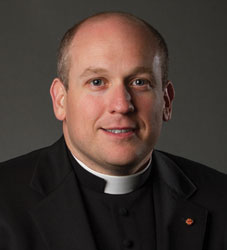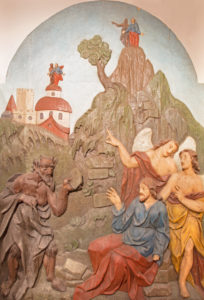 Temptation is real. It is not the stuff of legend and myth nor is it some figure of speech. Temptation is not sin and sometimes people inadvertently mingle the two. Temptation is an invitation to turn from God and to serve ourselves. If we consent to temptation then the actual act that constitutes the turning from God is what is sinful. We know that temptation itself cannot be sinful because of the Gospel proclaimed to us this weekend from Luke regarding Jesus being tempted by the devil. In fact, all four Gospels state that Jesus faced temptation.
Temptation is real. It is not the stuff of legend and myth nor is it some figure of speech. Temptation is not sin and sometimes people inadvertently mingle the two. Temptation is an invitation to turn from God and to serve ourselves. If we consent to temptation then the actual act that constitutes the turning from God is what is sinful. We know that temptation itself cannot be sinful because of the Gospel proclaimed to us this weekend from Luke regarding Jesus being tempted by the devil. In fact, all four Gospels state that Jesus faced temptation.
 Why was Jesus tempted? The Catechism (##538-540) teaches us that Jesus underwent temptation for us, to show us that we are not alone in our struggle to follow God’s will in our lives, and to show us that we can be victorious in the face of temptation. While the devil tempted Jesus through the allurements of pleasure, power, and honor, the basis for this temptation was Jesus’s sonship. Twice in Luke’s account of the temptation of Jesus the devil premises his temptations with “if you are the Son of God.” The devil tempted Jesus with a perverted notion of what Jesus’s sonship was while Jesus clung to the truth of his sonship which called for perfect obedience to the Father’s will. In the Garden, Adam and Eve lost sight of what it meant to be children of God, of the obedience that was expected of them and the grace that come as the fruit of obedience. Jesus in his temptation, and ultimately in the Cross, shows us that he is the new Adam whereby he completely and perfectly chooses the Father’s will over his own.
Why was Jesus tempted? The Catechism (##538-540) teaches us that Jesus underwent temptation for us, to show us that we are not alone in our struggle to follow God’s will in our lives, and to show us that we can be victorious in the face of temptation. While the devil tempted Jesus through the allurements of pleasure, power, and honor, the basis for this temptation was Jesus’s sonship. Twice in Luke’s account of the temptation of Jesus the devil premises his temptations with “if you are the Son of God.” The devil tempted Jesus with a perverted notion of what Jesus’s sonship was while Jesus clung to the truth of his sonship which called for perfect obedience to the Father’s will. In the Garden, Adam and Eve lost sight of what it meant to be children of God, of the obedience that was expected of them and the grace that come as the fruit of obedience. Jesus in his temptation, and ultimately in the Cross, shows us that he is the new Adam whereby he completely and perfectly chooses the Father’s will over his own.
When we pray the Lord’s Prayer, we ask the Father to “lead us not into temptation.” Immediately we are faced with the problem of an insufficient translation from the original Greek to English. We don’t have to ask God to not lead us into temptation. He won’t, because for him to do so would be contrary to his divine nature as God wants us to be free from the power of evil. However, God does allow is to be tempted. He allows us to be challenged to use the grace the he has given us to discern what is of him (good) and what is not (evil). Facing temptation and overcoming it leads to spiritual growth. Again, this is why prayer, the Sacraments, mediating on the Scriptures, and good works are all so important in our discipleship because these are pathways to the grace that we need.
Let us pray together that these Lenten days may be a time of increased grace for all us through our prayer, fasting, and acts of charity. The grace given to us, that is the fruit of these holy acts, will strengthen us in our struggle against temptation and evil and allow us to stand victorious with the Lord Jesus over the power of sin and death in our lives.
Father Christopher House is the Rector of the Cathedral and serves in various roles within the diocesan curia, namely Chancellor and Vicar Judicial.